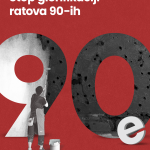
STOP THE GLORIFICATION OF THE WARS OF THE 1990S
01/09/2025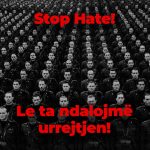
Stop Hate! / Le ta ndalojmë urrejtjen!
04/09/2025TVCG IN THE SERVICE OF REVISIONISM AND THE RELATIVIZATION OF CRIMES
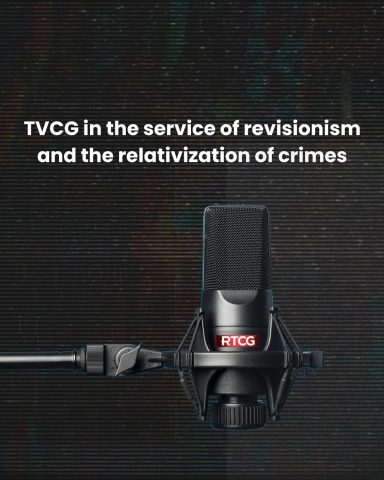
A group of non-governmental organizations and civic activists today submitted a complaint to the Ombudsman of RTCG regarding the programme “Loudly: The Face and Reverse of Controversial Monuments in Montenegro” broadcast on 1 September.
The complaint was submitted by: Media Center, Human Rights Action (HRA), Centre for Civic Education (CCE), Centre for Women’s and Peace Education ANIMA, Centre for Investigative Journalism of Montenegro (CIN CG), Ipso Facto, Institute for Media of Montenegro, Jovana Marović, and Dina Bajramspahić.
According to the complainants, the programme “Loudly: The Face and Reverse of Controversial Monuments in Montenegro” deviated from the objectives defined by the RTCG Rulebook on Programme Principles and Professional Standards. The Rulebook states that RTCG shall “process events in Montenegro, the region, and beyond in a timely, comprehensive, objective, balanced, and credible manner, supporting fair and constructive dialogue at the local, regional, and national level.” The programme dealt with the issue of controversial erection of monuments to collaborators of the occupiers from the Second World War, with one of these monuments erected years ago, and another at the beginning of August 2025. This means that RTCG did not timely address this controversial and provocative topic. For comprehensiveness and objectivity, the dispute over the monuments should not have been reduced to a single historical aspect, but also explained from the legal perspective, which is the reason why the monuments were removed. In that context, the interlocutors should have included representatives of the state prosecutor’s office, the Ministry of Culture and Media, and the Police Administration, not only historians.
For the sake of objectivity, the introduction should have presented all relevant and undisputed facts about the figures to whom the controversial monuments were dedicated. However, this did not happen. In his opening remarks, the host said that Đurišić was a Chetnik commander, while he said nothing about Čelić. The host should not have remained silent about the fact that Đurišić was a quisling, an accomplice of the occupiers, and responsible for mass war crimes, as determined by the State Commission for the Investigation of the Crimes of the Occupiers and Their Helpers of the Federal People’s Republic of Yugoslavia.
The professional standard prescribed by the RTCG Rulebook concerning “credibility” suggests that: “journalists and editors are responsible not only for what they publish but also for what they omit, if it is in the public interest,” while the professional standard “accuracy” states that: “the conveyed message must reflect accurate facts and must not lead to erroneous conclusions.”
The host already made it clear at the beginning of the programme that he had no regard for professional standards by failing to state that Đurišić was a quisling who had been declared a war criminal. This approach was further emphasized by his first question to historian Rastoder: Was Pavle Đurišić a war criminal? – thereby relativizing what is reliably known about Đurišić’s character and actions and making legitimate the question of his legal and political rehabilitation.
Also, during the programme one of the guests, Stamatović, expressed views that not only revise established facts about the war criminal Đurišić but also promote discrimination against one ethnic group in Montenegro. The host was obliged to react to these statements and uphold professional standards. Instead, he allowed the discussion on an important issue of public interest to be reduced to a personal level – where someone’s ancestors fought, where someone was born, mocking nicknames, and similar trivialities – thus permitting an extremely degrading discourse. It turned out that the public broadcaster, instead of educating about facts and the objective context in which they should be placed, provided a lesson in vulgarity – how to apply low personal attacks against an interlocutor on a matter of public interest. Additionally, a dangerous discriminatory approach was promoted – the idea that someone’s personal origin can disqualify them from participating in the debate. What is particularly scandalous is that RTCG itself promoted precisely that part of the conversation on social media (“which one of you Rastoders sat under the Elm tree, while mine did; none of you Rastoders created this Montenegro, but mine did…”) thereby further legitimizing a debased level of debate, wholly inappropriate for a public service broadcaster.
By bringing into the studio two historians with opposing views on the subject, only an illusion of balance was achieved, and around a topic that was not, in fact, the one initially announced. With such an approach and manner of presentation, the programme indirectly contributed to inciting and spreading hatred, encouraging prejudice against individuals, rather than shedding light on the work of institutions in removing unlawful monuments.
We remind that the RTCG Rulebook on Programme Principles and Professional Standards stipulates: “RTCG shall not broadcast programs that contain and promote messages of hatred, incite hatred, or prejudice against an individual, group, or community.” Unfortunately, all of this was allowed by the programme’s host.
Despite the programme’s announcement stating that it would shed light on the question “Truth or political-historical propaganda. Who loses, and who profits from divisions?”, the essence of the broadcast was a re-examination of historical facts about the war criminal Pavle Đurišić. In doing so, it became part of the political efforts of historical revisionism led by the Serbian Orthodox Church and certain ruling political parties. Instead of analyzing divisions and those who benefit from them, the dialogue was reduced to a personal level, aligning the public broadcaster with those who deepen rifts in an already polarized society.
Goran Đurović, Media center
Tea Gorjanc Prelević, Human Rights Action (HRA)
Daliborka Uljarević, Centre for Civic Education (CCE)
Ervina Dabižinović, Centre for Women and Peace Education ANIMA
Milka Tadić Mijović, Center for Investigative Journalism of Montenegro (CIN CG)
Milena Popović Samardžić, Ipso Facto
Olivera Nikolić, Montenegrin Media Institute
Jovana Marović, civic activist
Dina Bajramspahić, civic activist


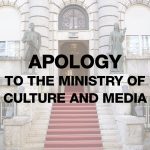
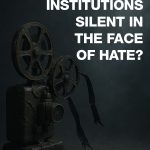



 English
English